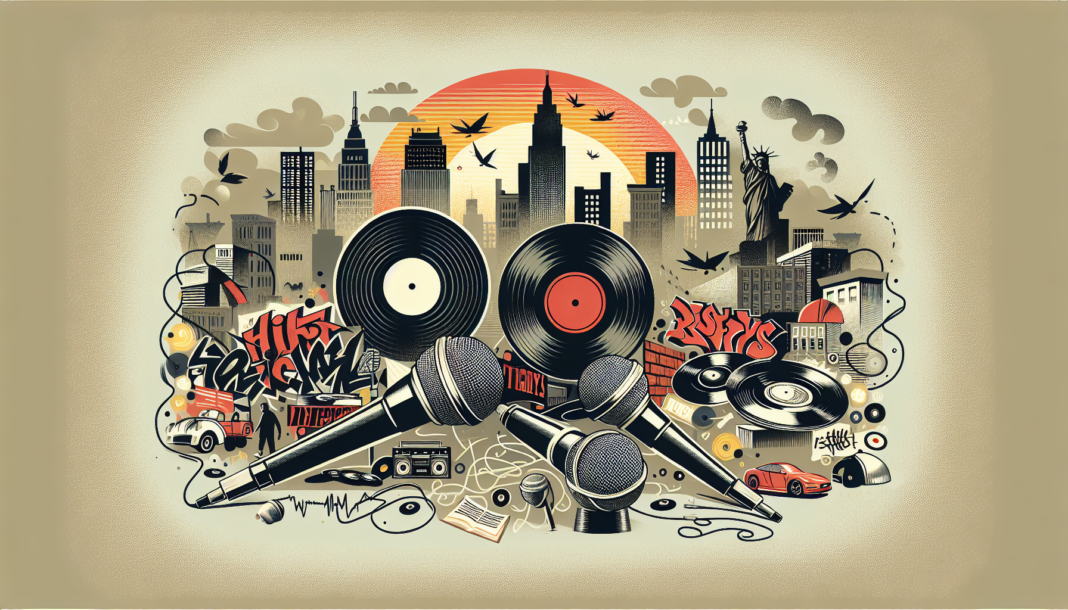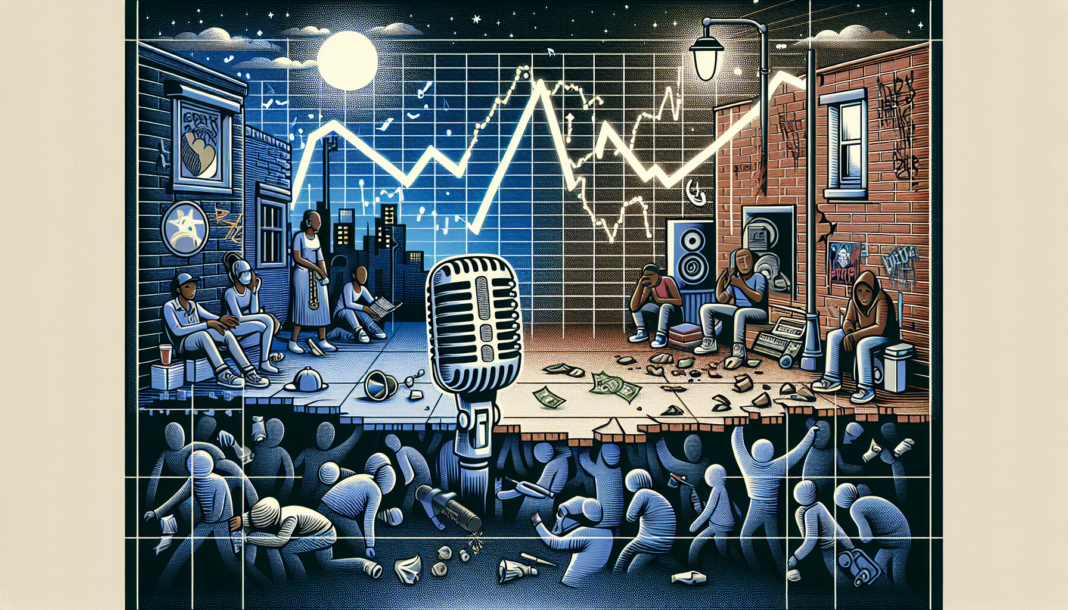Hip-Hop Culture: A Reflection of Society
Exploring the roots of hip-hop culture reveals a fascinating tapestry woven from societal influences over the course of five decades. From its humble beginnings in the Bronx to its global impact today, hip-hop has undergone a remarkable evolution, mirroring the changes and challenges faced by society.
The Evolution of Hip-Hop over Five Decades
| Decade | Key Developments |
|---|---|
| 1970s | Birth of hip-hop in New York City; DJing, MCing, graffiti, and breakdancing emerge as pillars of the culture |
| 1980s | Golden age of hip-hop; rise of iconic artists like Run-DMC, LL Cool J, and Public Enemy |
| 1990s | Commercialization of hip-hop; emergence of West Coast vs. East Coast rivalry; rise of gangsta rap |
| 2000s | Hip-hop goes mainstream; fusion with other genres like pop and R&B; growth of internet and digital era |
| 2010s | Diversity and globalization of hip-hop; increased social consciousness; blurring of genre boundaries |
Influence of Violence on Hip-Hop’s Identity
| Aspect | Impact on Hip-Hop |
|---|---|
| Street Culture | Hip-hop’s origins in marginalized urban communities; reflection of street violence, poverty, and systemic inequalities |
| Lyrics and Themes | Portrayal of gang violence, police brutality, and struggles of inner-city life; controversial lyrics addressing real-life issues |
| Artist Persona | Incorporation of tough and aggressive image by some artists; propagation of ‘beef’ culture and confrontational attitudes |
The evolution of hip-hop over the past five decades showcases a dynamic interplay between societal changes and cultural expressions. Violence has played a significant role in shaping the identity and narrative of hip-hop, often reflecting the harsh realities faced by many within urban communities. Understanding this complex relationship is crucial to grasping the deeper layers of hip-hop culture and its enduring impact on society.
Unveiling Hip-Hop Beef History
Exploring the roots of conflict within the hip-hop community sheds light on the evolution of this dynamic genre. Understanding the origins of hip-hop beef and its impact on both artists and communities is essential to grasp the intricate relationship between music, culture, and societal issues.
Origins of Hip-Hop Beef
Hip-hop beef, or conflicts between artists within the hip-hop community, has a long history rooted in competition, ego, and self-expression. The origins of these rivalries can be traced back to the early days of hip-hop, where artists used their music to assert dominance, challenge each other’s skills, or settle personal disputes.
| Decade | Notable Beef | Reasons |
|---|---|---|
| 1980s | KRS-One vs. MC Shan | territorial disputes |
| 1990s | Tupac Shakur vs. The Notorious B.I.G. | personal animosity, East Coast-West Coast rivalry |
| 2000s | Jay-Z vs. Nas | lyrical sparring, competition for the throne |
| 2010s | Drake vs. Meek Mill | social media feud, allegations of ghostwriting |
Impact of Beef on Artists and Communities
The repercussions of hip-hop beef extend beyond the artists involved, impacting their careers, relationships, and even safety. Beef can shape an artist’s public image, influence their fan base, and ultimately determine their success in the industry. Additionally, beef between artists can escalate tensions within communities, perpetuate stereotypes, and spark further conflicts among fans.
| Impact | Artists | Communities |
|---|---|---|
| Career | Publicity boost or backlash | Division among fans |
| Relationships | Collaborations severed or strengthened | Increased aggression |
| Safety | Threats of violence or retaliation | Heightened tensions |
By unearthing the history of hip-hop beef and examining its far-reaching effects on artists and communities, we can gain a deeper understanding of the complexities within the hip-hop culture. From the fiery battles of the past to the ongoing disputes of the present, hip-hop beef remains a compelling and controversial element that continues to shape the narrative of this influential music genre.
Glorification vs. Condemnation
In the realm of hip-hop music, the portrayal of violence in lyrics has been a subject of debate, leading to contrasting views on its impact and significance within the genre. This section delves into the two opposing perspectives: the depiction of violence in hip-hop lyrics and societal perceptions surrounding hip-hop beef.
Portrayal of Violence in Hip-Hop Lyrics
Hip-hop lyrics often feature vivid narratives that reflect the harsh realities of urban life, including themes of violence, crime, and struggle. Artists use their words to paint a picture of the challenges faced in marginalized communities, providing a platform to voice the experiences and emotions of those often silenced by society.
While some argue that these portrayals shed light on important social issues and serve as an outlet for expression and storytelling, others criticize the normalization of violence and aggression in hip-hop lyrics. The graphic descriptions of violent acts can sometimes perpetuate negative stereotypes and glamorize destructive behaviors, impacting the perception of hip-hop as a whole.
Societal Perceptions of Hip-Hop Beef
The concept of hip-hop beef, characterized by public disputes and rivalries between artists, has been both sensationalized and condemned by different segments of society. Some view these conflicts as a natural part of the competitive nature of the music industry, adding excitement and drama to the hip-hop culture. Conversely, others argue that beefs can escalate tensions, promote violence, and perpetuate harmful stereotypes, particularly within urban communities.
The societal perceptions of hip-hop beef often hinge on the underlying motives behind these conflicts. While some beefs are rooted in personal grievances or artistic competition, others stem from larger systemic issues such as poverty, racism, and inequality. Understanding the complex dynamics at play in hip-hop beef is essential to deciphering its impact on artists, communities, and broader cultural narratives.
As hip-hop continues to evolve, the ongoing debate between the glorification and condemnation of violence in lyrics, as well as the perceptions of hip-hop beef, remains a critical dialogue within the music industry and society as a whole. By critically examining these themes, we can gain deeper insights into the multifaceted nature of hip-hop culture and its enduring legacy in the realm of music and social commentary.
Real-life Consequences
Exploring the ramifications of violence within the realm of hip-hop unveils the profound impact it has on both artists and the communities they represent.
Violence’s Effects on Artists
The prevalence of violence within the narrative of hip-hop has not been without consequences for the artists themselves. From physical altercations to verbal disputes escalating into dangerous situations, instances of violence have taken a toll on the mental and emotional well-being of many artists. Furthermore, the glorification of aggression and conflict in hip-hop culture can perpetuate a cycle of retaliation and hostility, endangering the safety of those involved.
Community Responses to Hip-Hop Beef
In response to instances of hip-hop beef characterized by violence, communities have demonstrated a wide range of reactions. While some view these conflicts as reflections of the harsh realities faced by marginalized populations and use music as a means of expressing their struggles, others condemn the glorification of violence within the genre. Community leaders and activists often work to address the systemic issues that contribute to this cycle of violence, advocating for positive outlets and solutions to break free from the destructive patterns perpetuated by hip-hop beef.
Through an examination of the real-life consequences of violence in hip-hop, it becomes evident that the impact goes beyond the music industry, leaving a lasting imprint on artists and communities alike. Efforts to address these issues and promote a more positive and empowering narrative within hip-hop are essential to fostering a culture of unity, resilience, and social change.
Legacy and Lessons
When delving into the historical context of hip-hop, it is imperative to examine the enduring impact it has had on both music culture and societal perceptions. Reflecting on this legacy provides invaluable insights into the evolution of hip-hop over the past five decades.
Examining the Lasting Impact
The enduring legacy of hip-hop extends far beyond its musical influence. From its humble beginnings in the Bronx to its global reach today, hip-hop has been a powerful force for social change and self-expression. The genre’s ability to amplify marginalized voices and shed light on systemic injustices has left an indelible mark on popular culture.
One of the most significant impacts of hip-hop is its role in challenging societal norms and advocating for social justice. Through powerful lyrics and emotive storytelling, hip-hop artists have addressed issues such as racism, poverty, police brutality, and economic inequality. This legacy of speaking truth to power continues to resonate with audiences worldwide, inspiring activism and change.
Learning from Hip-Hop’s History
As we reflect on hip-hop’s history, there are valuable lessons to be learned from the genre’s journey. Hip-hop serves as a mirror that reflects the realities of urban life, shedding light on the struggles and triumphs of marginalized communities. By studying hip-hop’s past, we gain a deeper understanding of the cultural, social, and political forces that have shaped the genre and its artists.
One crucial lesson from hip-hop’s history is the power of resilience and creative expression in the face of adversity. Despite facing barriers and setbacks, hip-hop has thrived as a platform for artists to share their experiences, aspirations, and struggles. This resilience serves as a testament to the enduring spirit of hip-hop and its ability to spark meaningful conversations and drive social change.
By learning from hip-hop’s history, we can cultivate a greater appreciation for the genre’s cultural significance and the voices it amplifies. Hip-hop’s legacy offers a blueprint for understanding the complexities of race, identity, and power dynamics, urging us to engage critically with the narratives that shape our world.
The Call for Change
In the realm of hip-hop, there is a growing recognition of the need to address systemic violence and its impact on both artists and communities. This call for change is multifaceted, encompassing efforts to confront the roots of violence within the industry and harness the power of hip-hop as a force for empowerment and positive transformation.
Addressing Systemic Violence
Systemic violence within the hip-hop community remains a prevalent issue that cannot be overlooked. The perpetuation of violence through lyrics, feuds, and real-life conflicts has contributed to a cycle of harm that affects not only individual artists but also the broader cultural landscape. Addressing systemic violence requires a multi-faceted approach that delves into the socioeconomic factors, historical inequalities, and power dynamics at play.
Root Causes of Systemic Violence in Hip-Hop
| Factors Contributing to Systemic Violence | Description |
|---|---|
| Socioeconomic Disparities | High poverty rates and limited access to resources in urban communities contribute to the prevalence of violence. |
| Historical Trauma | Legacies of racism, discrimination, and trauma have shaped the narrative of hip-hop, often manifesting in violent expressions. |
| Power Struggles | Competition for recognition, influence, and success in the industry can fuel conflicts and tensions among artists. |
Empowering Communities Through Hip-Hop
While hip-hop has been intertwined with narratives of violence, it also serves as a powerful tool for empowerment and social change. By leveraging the influence and reach of hip-hop, communities can reclaim their voices, advocate for justice, and foster resilience in the face of adversity.
Community Empowerment Initiatives
| Initiatives for Empowering Communities | Description |
|---|---|
| Youth Mentorship Programs | Pairing aspiring artists with industry professionals to provide guidance, education, and support. |
| Social Justice Campaigns | Using hip-hop as a platform to raise awareness, advocate for change, and mobilize communities around key social issues. |
| Creative Expression Workshops | Providing spaces for individuals to express themselves through music, art, and storytelling, fostering a sense of identity and community. |
By acknowledging the call for change within the hip-hop landscape, stakeholders have the opportunity to explore new pathways for promoting peace, resilience, and empowerment within the community. Through collective efforts and a commitment to addressing systemic violence, hip-hop can continue to evolve as a platform for social consciousness, unity, and positive transformation.





